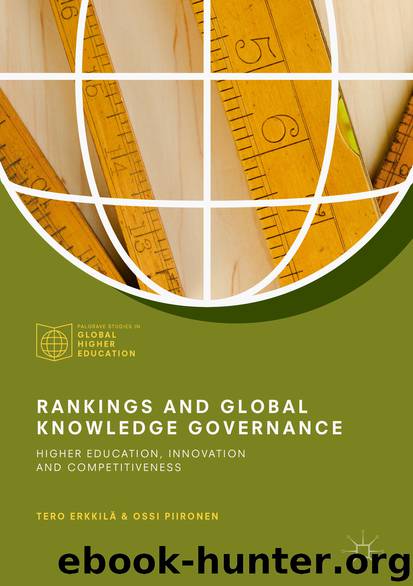Rankings and Global Knowledge Governance by Tero Erkkilä & Ossi Piironen

Author:Tero Erkkilä & Ossi Piironen
Language: eng
Format: epub
Publisher: Springer International Publishing, Cham
Field Structuration in Global Ranking
There are similar patterns of development in rankings of state knowledge in different policy domains. Most notably, there are methodological changes in the indicators, as the critique of ranking has led to the emergence of more sophisticated nonaggregate measurements and “actionable indicators” in university rankings and indicators of good governance. Also, the limitations of ranking economic competitiveness have also been discussed critically. Furthermore, there is also critique toward to the existing rankings in terms of their scope and level of analysis. In supplementing the existing rankings, measurements of innovation have emerged.
In an effort to secure a position in the field, the actors engage in the production of competing classifications of reality, alternative indicators (Kauppi and Erkkilä 2011, 316). This entails political conflict and occasionally the critique of existing indicators can also be interpreted as their politicization (cf. Palonen 2003). But as we will show, this rather serves as a stepping-stone for new actors to enter the field. To argue for the need of yet another indicator, the actors wishing to join the activity seek to demonstrate weaknesses in the existing figures.
Figure 5.1 shows the dynamic between the critique of ranking and field structuration in indicator-based knowledge governance (see Chap. 2). The critique of existing indicators for their methodology and scope allows new actors to enter the scene with their alternative sets of indicators. This also further embeds the use of numerical assessment in transnational governance. One characteristic of structuration is the unintentional reproduction of practices already existing in the field (Baert 1991; Giddens 1984, 5). We observe the field development of global ranking where actors claiming to change existing practices come to replicate them. This owes to the logic of numerical knowledge production—building on social scientific methods and practices of verification—that leads to a boundary work on the validity of measurements (Gieryn 1983, 782).
Fig. 5.1Global knowledge governance: field structuration and fragmentation of indicators
Download
This site does not store any files on its server. We only index and link to content provided by other sites. Please contact the content providers to delete copyright contents if any and email us, we'll remove relevant links or contents immediately.
Spare by Prince Harry The Duke of Sussex(5175)
Navigation and Map Reading by K Andrew(5150)
Tuesdays with Morrie by Mitch Albom(4769)
Machine Learning at Scale with H2O by Gregory Keys | David Whiting(4292)
Cracking the GRE Premium Edition with 6 Practice Tests, 2015 (Graduate School Test Preparation) by Princeton Review(4277)
Never by Ken Follett(3937)
Goodbye Paradise(3798)
What It Really Takes to Get Into Ivy League and Other Highly Selective Colleges by Hughes Chuck(3744)
Fairy Tale by Stephen King(3370)
Harry Potter and the Prisoner of Azkaban (Book 3) by J. K. Rowling(3347)
Pledged by Alexandra Robbins(3170)
Kick Ass in College: Highest Rated "How to Study in College" Book | 77 Ninja Study Skills Tips and Career Strategies | Motivational for College Students: A Guerrilla Guide to College Success by Fox Gunnar(3116)
Reminders of Him: A Novel by Colleen Hoover(3092)
A Dictionary of Sociology by Unknown(3073)
Sapiens and Homo Deus by Yuval Noah Harari(3064)
The Social Psychology of Inequality by Unknown(3018)
Graduate Admissions Essays, Fourth Edition: Write Your Way into the Graduate School of Your Choice (Graduate Admissions Essays: Write Your Way Into the) by Asher Donald(2907)
Will by Will Smith(2907)
Zero to Make by David Lang(2777)
